How Much Will It Cost to Feed 50 People Cake in Missouri
This cake pricing guide has been a long time coming. I cannot begin to tell you how many times I've been asked how to price a cake.
Whenever I get that question, it takes me back to the beginning of my cake journey. When I sold my first cake, I had no idea how much a homemade, custom cake should cost.
I had no idea how much my cakes cost to make, and I was comparing my cakes to grocery store cake prices.
Overtime I learned to value my time and effort, and began to recognize the type of people I wanted to bake for. But I still undercharged my cakes for YEARS!
The main reason I'm sharing this post is to help you value the hours of work you put into your custom cakes, and help you charge the right price for them.
The goal of this cake pricing guide is to:
- help you recognize the worth of your time
- ensure you are consistently making a profit on your cakes
- empower you to properly price your cakes based on your customers/region
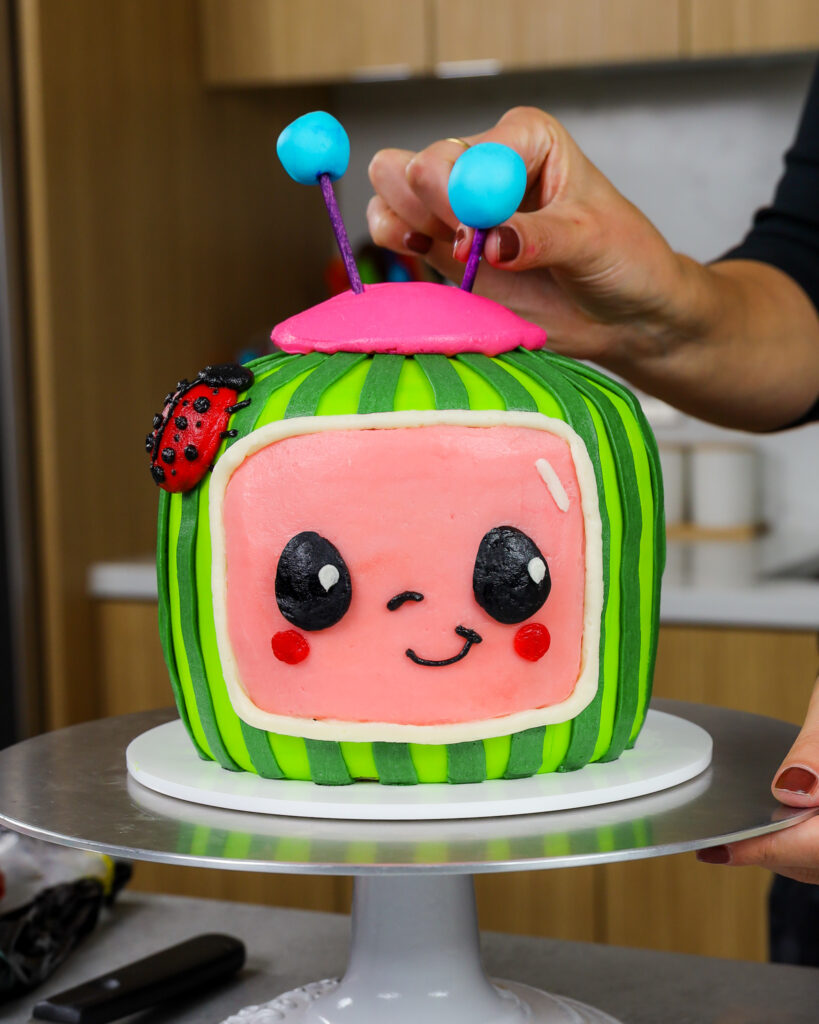
Basic Formula to Price a Cake
I like to use the formula below to calculate the price of a custom cake. I use this for smaller custom cakes, rather than wedding cakes (which are usually priced by the number of servings).
Cake Price = Labor (hours of estimated work x your hourly rate) + Cost of Ingredients + Overhead
It comes down to basic cost accounting, factoring in your direct and indirect costs. And of course, valuing your time!
I want to highlight that this concept also applies to homemade cookies and cupcakes. It really works for any baked good that a home baker can make.
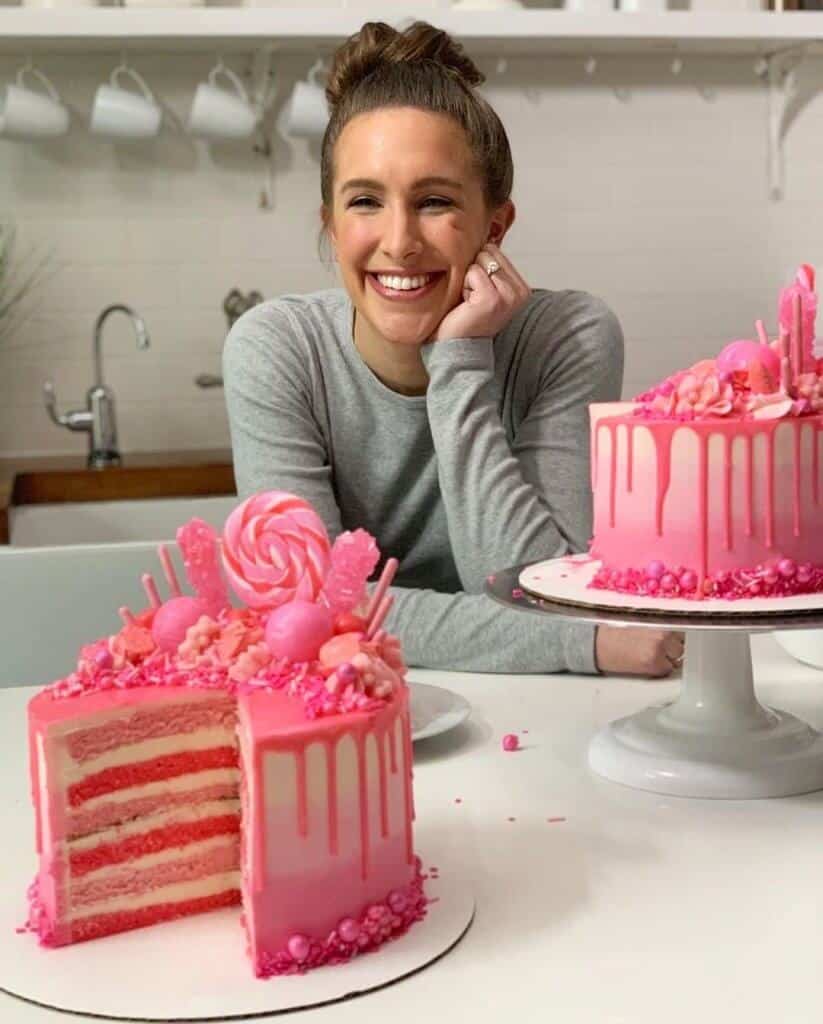
Labor: Valuing Your Time
Yup, that's right. Your time is valuable, and you should be paid for your skills.
You are a cake artist, and the number of hours you expect to spend on a cake should be factored in. If someone asks for an intricate cake topper, or delicate sugar flowers, it should be built into the price.
Estimating the Time a Cake Will Take
Now I'm sure you're thinking, "but what if a cake takes longer than I think it will??"
And that is where it gets hard. Sometimes a client might ask for something that you've never done before. You might have no idea how long it will take, or if you'll have to try making something multiple times.
In those types of situations, you just have to make the best estimate you can, and hope that you're close. Some cakes will take longer than expected, and some cakes will take less. I try to tell myself it all averages out in the end.
I also want to note that I only consider active time for this part of the equation. Inactive time like allowing your cake layers to cool, or a fondant feature to harden are not included in this.
Hourly Rate
The other part that can be hard to figure out is your hourly rate. The further you are in your cake journey, the easier it is to figure this out.
I know when I was first starting, I felt grateful just to have cake orders. I also wasn't as experienced or confident in my skills. The thought of paying myself for each cake I made seemed crazy.
But you know what? If you worked in a bakery, you'd get paid an hourly rate!! You should pay yourself at least minimum wage, even if you feel like you're still learning.
You can also adjust your rate to take your experience and skills into account. You might start out at a lower rate, but as you develop your abilities over time, you can increase your rate.
Cost of Ingredients: Direct Costs
Now onto the second part of my equation, the cost of your ingredients! These are considered to be your direct costs.
Direct costs include the ingredients you use to make each cake. It's incredibly important that you track these, so you know how much it costs you to make a cake.
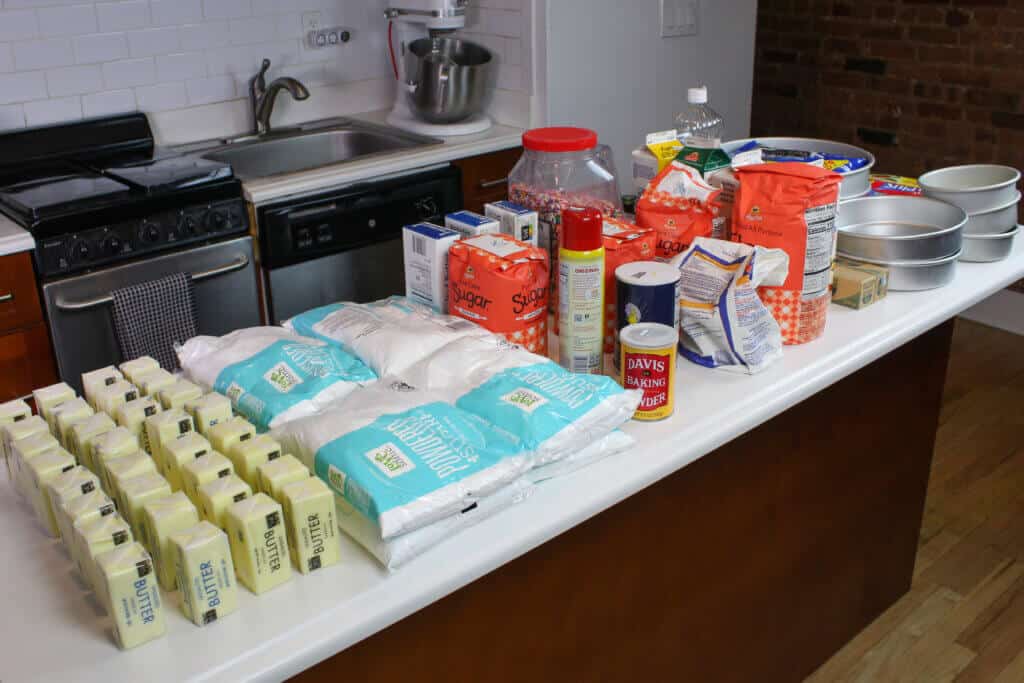
Most of us have our list of go-to recipes (like my vanilla cake recipe), and it's actually pretty easy to calculate the cost with a little bit of leg work.
This might be my inner CPA showing, but I created an Excel spreadsheet to help me quickly calculate the cost of each of my cakes. I know that not everyone loves numbers as much as me, but I do think that most bakers out there enjoy being organized and precise.
Create a Pricing Spreadsheet
A costing sheet is easier to make than you think, and once it's created, the file does all the hard work for you.
List Out Your Ingredients
I made a master sheet of every ingredient I buy for my cakes, ranging from butter to freeze-dried strawberry powder! After I made my ingredients list, I created a price column next to it.
Price of Each Ingredient
I then scoured my grocery store and receipts to figure out the price of each ingredient.
But you don't need to know how much a container of salt is. You need to know much a tsp costs, or how much a cup of flour is! The next column I made shares a standard portion size for each ingredient.
For instance, I measure baking powder by the teaspoon, and brown sugar by the cup.

Calculate the Cost per Unit
This next step takes some time. You have to figure out how many servings of each ingredient a container or bag has. For example, a small bag of granulated sugar contains about 8 cups of sugar.
If you've made it this far, you're golden. You can now easily calculate the cost per unit of each ingredient, and link it to your recipes!
Calculate the Cost for Your Most Popular Recipes
I made a tab for each of my most popular cake recipes, and then calculated the cost of each of my batter and frosting flavors.
I know this is a ton of work, but it's worth it. It also helps you know how much money you're actually making on each cake you sell.
Overhead and Special Equipment: Indirect Costs
Now we're finally to the last component of our equation – indirect costs!
Indirect costs include anything you pay for to make a cake, other than ingredients.
This can include variable costs like cake boxes, cardboard cake rounds, parchment paper, or even specific cutters or molds that you have to buy to complete a cake order.
It also includes fixed costs, like rent, electricity, or big baking purchases like ovens or stand mixers.
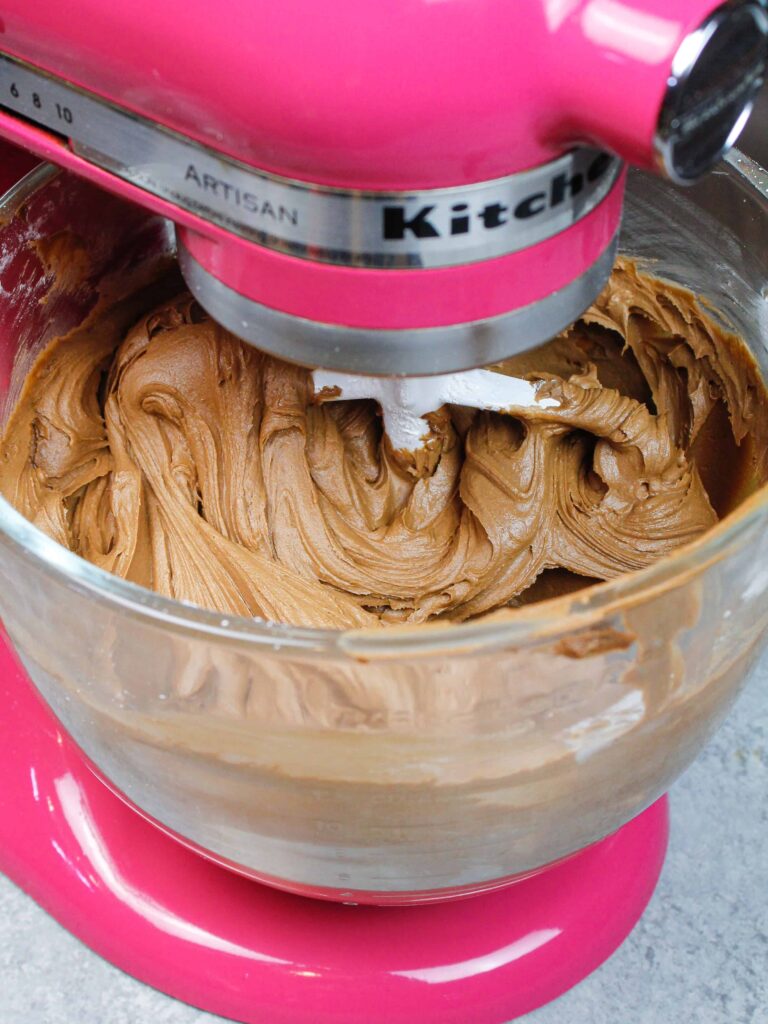
Most of us home bakers don't rent out a separate space, but I think almost all of us have invested in baking equipment!
Whether it's an edible printer, or an air brush, you should calculate the depreciation of those tools over their expected lifetime, and add them into your overhead.
This way, you've truly included in all the costs you incur to make cakes. These types of costs can really add up, so it's important you consider them in your pricing.
Recognizing Your Clientele
Like I mentioned earlier, one of the biggest mistakes home bakers can make is trying to compete with grocery stores. I think we've all done it at some point in time.
But the people who run to Walmart last minute to pick up a sheet cake are not the same people who are reaching out to you weeks (or months) in advance to create a custom cake for someone special.
Grocery chains use cheaper ingredients, and bake in bulk. You are using top of the line ingredients, and creating special flavors and beautiful decorations.
Your price should not be anywhere close to the price of a grocery store cake.
You Should Be Too Expensive For Some People
Back in 2016 (when I still sold my cakes), my average rate for an 8-inch layer cake was $100. I had more demand than I could handle, and people are willing to pay a pretty penny for custom things here in NYC.
And even then, people still told me I should charge more for my cakes. It blew my mind.
People frequently spend $100+ on a custom cake. Your rate should be high enough that it causes some people to walk away. If no one is telling you that you're too expensive, you're probably not charging enough.
If you're unsure how much people in your area are willing to pay for a custom cake, it's ok to ask around.
You can get a read on prices in your area by reaching out to other custom bakers in your area. It's also a great way to network!
Don't Try To Undercut Other Bakers / Bakeries
Just be sure you don't try to undercut other local bakers or cake shops in price. The cake community is small, and you want to support your fellow bakers.
If you get a cake order solely because your rate is cheaper, you might not be gaining the clientele you want. The type of person who shops around for the cheapest custom cake they can find is usually not someone you want to be a repeat customer. Trust me on that!
You also can devalue custom baking in your area if you set your prices too low, which hurts everyone in the end.
Understand That Other Bakers Aren't Competition, They're Fellow Artists
In the beginning of my cake journey, I naively saw other bakers as competition.
In reality, each cake maker has their own unique style and offerings. It might take a bit of time to develop your style, but you will naturally the more cakes you make.
I found that I loved working with American buttercream, and enjoyed colorful, playful cake designs!
What Goes Around Comes Around
I rarely work with fondant, and whenever I'd get a request for a fondant intensive cake, I'd happily refer them to my other cake friends who specialized in those types of cakes.
Or if my cake schedule was fully booked, I'd send people over to other local bakers I knew and respected.
They returned the favor when the same thing happened to them, and it created a great relationship between all of us.
Delivery vs. Pick Up
Another rookie mistake I made in the beginning? I DIDN'T CHARGE FOR DELIVERY. I cringe saying that out loud.
Always charge a fee if someone wants you to deliver a cake. You can choose to have a fixed rate for deliveries within a certain radius, or you can charge based on the distance.
Either way, be sure to consider the cost of gas, the wear and tear on your car, and the value of the time it takes you to deliver the cake.

Strategies for Friends and Family
Now you know how to price a cake for clients, but what do you do when friends and family ask for cakes??
There is no right answer to this, and it's a personal decision. I've heard of bakers doing a variety of different things, including:
- Setting a specific discount (i.e. 50% off)
- Just charging for ingredients
- Making cakes for free, but only for immediate family members
- Charging full price
Whatever strategy you choose, make it very clear in the beginning. When you explain how much money and time go into making a cake, most people are very understanding.
I enjoyed making my friends' birthday cakes for free, and always looked at it as my gift to them! They never asked or expected me to bake for them, so I never felt any pressure around it.
But I also didn't have my extended family asking for baptism and anniversary cakes.
However, a lot of people are in a different situation. If you have demanding relatives or friends who expect you to drop everything and make elaborate cakes for them, I recommend setting ground rules upfront.
This will help temper expectations, and prevent future conflict.
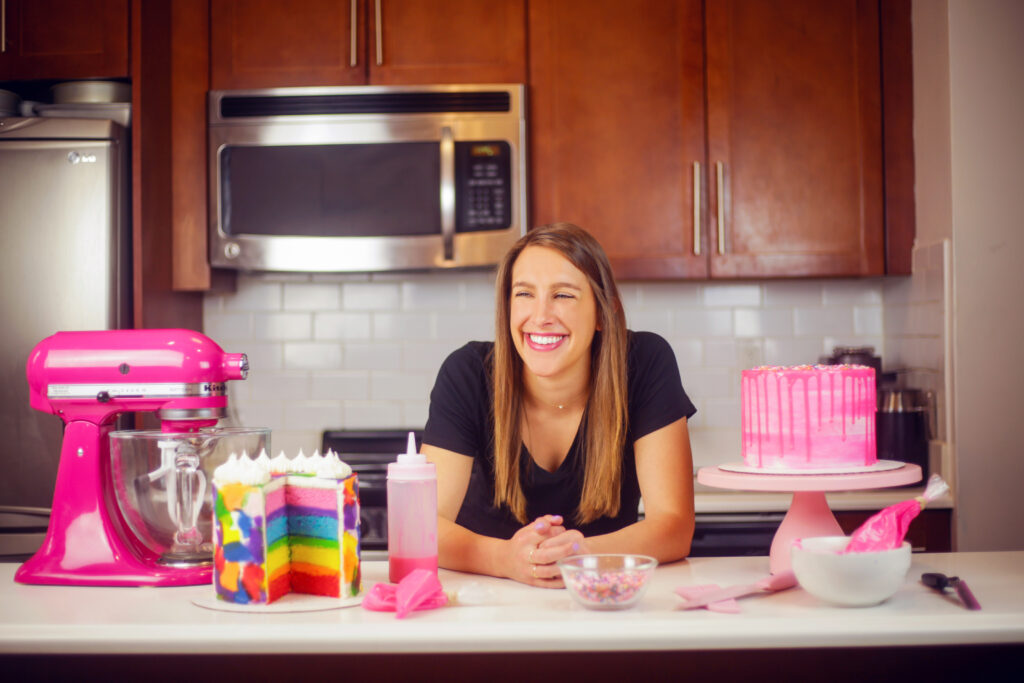
Key Takeaways on How To Price a Cake:
- Value your time
- Closely track the cost of your ingredients
- Build additional costs (for cake boxes, special equipment, etc.) into your price
- Understand the clientele you're after, and work hard to grow that base
- Network with other local bakers
- Charge for delivery
- Set a standard expectation for friends and family, to avoid uncomfortable situations
Let Me Know Your Thoughts!
If you have any additional tips on how to price a cake, or any questions I didn't answer, please leave a comment below 🙂
Other Related Posts:
- Why I Quit My Job To Pursue My Baking Business Full-Time
- Things To Consider Before Quitting Your Corporate Job
- What Do I Do With All My Cakes That I Don't Sell
- My Business Model: A Baker That Doesn't Sell Her Cakes
rhodessubbeirie95.blogspot.com
Source: https://chelsweets.com/cake-pricing-guide-how-to-price-a-cake/
0 Response to "How Much Will It Cost to Feed 50 People Cake in Missouri"
Post a Comment